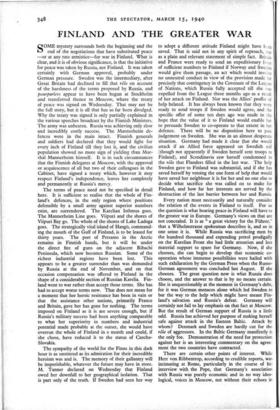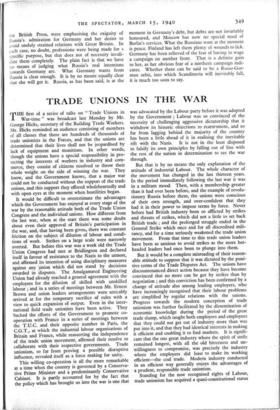FINLAND AND THE GREATER WAR
SOME mystery surrounds both the beginning and the end of the negotiations that have substituted peace —or at any rate armistice—for war in Finland. What is clear, and it is of obvious significance, is that the initiative for peace was taken by Russia, not Finland. It was taken certainly with German approval, probably under German pressure. Sweden was the intermediary, after Great Britain had declined to fill that role on account of the harshness of the terms proposed by Russia, and pourparlers appear to have been begun at Stockholm and transferred thence to Moscow, where the treaty of peace was signed on Wednesday. That may not be the full story, but it is all that has so far been divulged. Why the treaty was signed is only partially explained in the various speeches broadcast by the Finnish Ministers. The army was unbeaten. Russia was achieving only slow and incredibly costly success. The Mannerheim de- fences were in the main intact. Finnish generals and soldiers had declared that they would fight for every inch of Finland till they lost it, and the civilian population showed no more sign of yielding than Mar- shal Mannerheim himself. It is in such circumstances that the Finnish delegates at Moscow, with the approval or acquiescence of all but two of their colleagues in the Cabinet, have signed a treaty which, however it may respect Finland's independence, leaves her completely and permanently at Russia's mercy.
The terms of peace need not be specified in detail here. It is sufficient to realise that the whole of Fin- land's defences, in the only region where positions defensible by a small army against superior numbers exist, are surrendered. The Karelian Isthmus goes. The Mannerheim Line goes. Viipuri and the shores of Viipuri Bay go. The whole of the shores of Lake Ladoga goes. The strategically vital island of Hango, command- ing the mouth of the Gulf of Finland, is to be leased for thirty years. The port of Petsamo in the Arctic remains in Finnish hands, but it will be under the direct fire of guns on the adjacent Ribachi Peninsula, which now becomes Russian. Some of the richest industrial regions have been lost. This appears to be a greater surrender than was demanded by Russia at the end of November, and on that occasion compensation was offered to Finland in the shape of a considerable section of Russian Karelia. Fin- land went to war rather than accept those terms. She has had to accept worse terms now. That does not mean for a moment that her heroic resistance has been in vain or that the assistance other nations, primarily France and Britain, gave her has gone for nothing. The terms imposed on Finland as it is are severe enough, but if Russia's military success had been anything comparable to what her superiority in numbers and industrial potential made probable at the outset, she would have overrun the whole of Finland in a month and could, if she chose, have reduced it to the status of Czecho- Slovakia.
The sympathy of the world for the Finns in this dark hour is as unstinted as its admiration for their incredible heroism was and is. The memory of their gallantry will be imperishable, whatever the future may have in store. M. Tanner declared on Wednesday that Finland owed her downfall to her geographical isolation. That is part only of the truth. If Sweden had seen her way to adopt a different attitude Finland might have htn saved. That is said not in any spirit of reproach, but as a plain and relevant statement of simple fact. Britain and France were ready to send an expeditionary force of sufficient numbers to Finland if Norway and Sweden would give them passage, an act which would involve no urmeutral conduct in view of the provision made for precisely that contingency in the Covenant of the League of Nations, which Russia fully accepted till she was expelled from the League three months ago as a result of her attack on Finland. Nor was the Allies' proffer of help belated. It has always been known that they were ready to send troops if Sweden would agree, and the specific offer of some ten days ago was made in the hope that the value of it to Finland would enable her to persuade Sweden to co-operate to that extent in her defence. There will be no disposition here to pass judgement on Sweden. She was in an almost desperate situation. Germany had made it clear that she would attack if an Allied force appeared on Swedish soil (though not apparently if Sweden herself sent troops to Finland), and Scandinavia saw herself condemned to the role that Flanders filled in the last war. The help Sweden gave to Finland was substantial, and if she has saved herself by vetoing the one form of help that would have saved her neighbour it is for her and no one else to decide what sacrifice she was called on to make for Finland, and how far her interests are served by the destruction of the last barrier between her and Russia.
Every nation must necessarily and naturally consider the relation of the events in Finland to itself. For us the question is what bearing peace in Finland will have to the greater war in Europe. Germany's views on that are not concealed. It is as " a great victory for the FiIihrer," that a Wilhelmstrasse spokesman describes it, and so in one sense it is. While Russia was sacrificing men by the hundred thousand and expending petrol prodigally on the Karelian Front she had little attention and less material support to spare for Germany. Now, if she chooses, she can begin to develop that economic co- operation whose immense possibilities were hailed with such exhilaration by the German Press when the Russo- German agreement was concluded last August. If she chooses. The great question now is what Russia does choose, and the answer to that is by no means certain. She is unquestionably at the moment in Germany's debt, for it was German menaces alone which led Sweden to bar the way to the help which might have meant Fin- land's salvation and Russia's defeat. Germany will certainly not fail to lay emphasis on that fact at Moscow. But the result of German support of Russia is a little odd. Russia has achieved her purpose of making herself safe against attack in the Eastern Baltic. Attack by whom? Denmark and Sweden are hardly cut for the role of aggressors. In the Baltic Germany manifestly is the only foe. Demonstration of the need for protection against her is an interesting commentary on the agree- ment the two countries have contracted.
There are certain other points of interest. While Herr von Ribbentrop, according to credible reports, was intimating at Rome, particularly in the course of his interview with the Pope, that Germany's association with Russia was purely economic and in no way ideo- logical, voices in Moscow, not without their echoes it the British Press, were emphasising the exiguity of Russia's admiration for Germany and her desire to avoid unduly strained relations with Great Britain. In each case, no doubt, professions were being made for a specific purpose, but that does not of necessity invali- date them completely. The plain fact is that we have no means of judging what Russia's real intentions towards Germany are. What Germany wants from Russia is clear enough. It is by no means equally clear that she will get it. Russia, as has been said, is at the moment in Germany's debt, but debts are not invariably honoured, and Moscow has now no special need of Berlin's services. What the Russians want at the moment is peace. Finland has left them plenty of wounds to lick. Germany has been relieved of the fear of having to wage a campaign on another front. That is a definite gain to her, as her obvious fear of a northern campaign indi- cates. Whether there can be said to be a Russo-Ger- man orbit, into which Scandinavia will inevitably fall, it is much too soon to say.























































 Previous page
Previous page